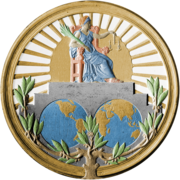| Nicaragua v. United States | |
|---|---|
 | |
| Court | International Court of Justice |
| Full case name | Case Concerning the Military and Paramilitary Activities in and Against Nicaragua (Nicaragua v. United States of America)[1] |
| Decided | June 27, 1986 |
| Citation | 1986 I.C.J. 14 |
| Court membership | |
| Judges sitting | Nagendra Singh, Guy Ledreit de Lacharrière, Roberto Ago, Mohammed Bedjaoui, Taslim Olawale Elias, Manfred Lachs, Kéba Mbaye, Ni Zhengyu, Shigeru Oda, José María Ruda, Stephen Schwebel, José Sette-Camara, Robert Jennings, Claude-Albert Colliard (ad hoc) |
| Case opinions | |
| Separate Opinion: Nagendra Singh Separate Opinion: Manfred Lachs Dissent: Stephen Schwebel Dissent: Robert Jennings | |
The Republic of Nicaragua v. The United States of America (1986)[2] was a case where the International Court of Justice (ICJ) held that the U.S. had violated international law by supporting the Contras in their rebellion against the Sandinistas and by mining Nicaragua's harbors. The case was decided in favor of Nicaragua and against the United States with the awarding of reparations to Nicaragua.
The Court had 15 final decisions upon which it voted. The Court found in its verdict that the United States was "in breach of its obligations under customary international law not to use force against another State", "not to intervene in its affairs", "not to violate its sovereignty", "not to interrupt peaceful maritime commerce", and "in breach of its obligations under Article XIX of the Treaty of Friendship, Commerce and Navigation between the Parties signed at Managua on 21 January 1956." In Statement 9, the Court stated that while the U.S. encouraged human rights violations by the Contras by the manual entitled Psychological Operations in Guerrilla Warfare, this did not make such acts attributable to the U.S.[3]
The United States refused to participate in the proceedings, arguing that the ICJ lacked jurisdiction to hear the case. The U.S. also blocked enforcement of the judgment by the United Nations Security Council and thereby prevented Nicaragua from obtaining any compensation.[4] Nicaragua, under the later, post-FSLN government of Violeta Chamorro, withdrew the complaint from the court in September 1992 following a repeal of the law which had required the country to seek compensation.[5]
- ^ Official name: Military and Paramilitary Activities in and against Nicaragua (Nicaragua v. United States of America), Jurisdiction and Admissibility, 1984 ICJ REP. 392 June 27, 1986.
- ^ http://www.worldlii.org/int/cases/ICJ/1986/1.html Archived March 29, 2022, at the Wayback Machine ICJ 1
- ^ "Military and Paramilitary Activities in and against Nicaragua (Nicaragua v. United States of America) Merits, Judgment, I.C.J. Reports 1986, p. 14" (PDF). International Court of Justice. Archived (PDF) from the original on November 14, 2020. Retrieved November 13, 2020.
"Summary of the Judgment of 27 June 1986". International Court of Justice. Archived from the original on January 22, 2009. Retrieved September 5, 2006. - ^ Morrison, Fred L. (January 1987). "Legal Issues in The Nicaragua Opinion". American Journal of International Law. 81 (1): 160–166. doi:10.2307/2202146. JSTOR 2202146. Archived from the original on February 5, 2012. "Appraisals of the ICJ's Decision. Nicaragua vs United States (Merits)"
- ^ "Human Rights Watch World Report 1993 – Nicaragua". Archived from the original on October 9, 2012. Retrieved September 18, 2009.